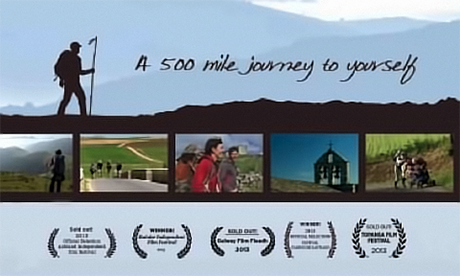This documentary depicts the reallife journey of pilgrims travelling by foot for 800 kilometres along Spain’s El Camino de Santiago.
The film, opening in New Zealand on August 6, focuses on the experiences of the pilgrims and their reaction to a daunting, but inspirational, journey on an ancient pilgrim route, called “The Way of St James”.
It takes six pilgrims from their starting point to the Cathedral of Santiago de Compostela in Spain where legend says the remains of James the Apostle, the patron Saint of Spain, lie buried and focuses on the most common route to Santiago from France, across the Iberian Peninsula, to Santiago.
The journey takes over 30 days.
The film is a reallife variation of the fictional movie, “The Way” (2010), starring Martin Sheen, which also honoured the Camino de Santiago by showing a group of pilgrims doing the walk.
Sheen is also associated with the making of this documentary.
The pilgrims from 3 to 73 years come from different countries. Together, they cross an entire country along hiking paths, stony roads, and narrow tracks with just a backpack, light provisions, a sense of adventure, and a willingness to find a deeper, more spiritual purpose to their existence.
The film tells us forcefully, that “the real Camino is their lives”.
- Tomas Moreno is doing the Camino walk without any idea about its physical rigours, and he starts the journey with blisters on his feet.
- Wayne Emde is doing the walk to honour the memory of his dead wife and is still grieving about his loss.
- Jack Greenhaigh is doing the walk to accompany his friend, Wayne.
- Annie O’Neill is committed religiously to the walk, but her physical health raises serious questions about whether she will be able to complete her journey.
- Sam from Brazil, is clinically depressed and has just lost her job, and a boyfriend on drugs, and is searching for what should come next in her life.
A travelogue and a spiritual quest
As a travelogue, the scenery is glorious, and the film’s photography is outstanding.
The movie takes us from bright sun to freezing rain through forests, valleys, over misty mountains, and by spectacular lakes and rivers.
The mountains form the foreground to richly coloured sunsets, and the fields are full of flowers.
As well, the film offers the viewer a charming and picturesque look at the different towns and villages along The Way, and we are transported to Santiago through towns and villages littered with scenic monasteries, churches, and wayside chapels.
As a spiritual quest, the film is inspiring.
There are many reasons why the six pilgrims want to complete the walk, and the movie captures the variability of their different motivations very movingly. They vary in their religious background, and in the particular motivation for why they want to do the journey.
They get tired, cry from time to time (not just from pain), and deal courageously with the obstacles in their path.
They are exhausted and exhilarated, feel lonely, want loneliness, and are deeply grateful for the sharing of the highs and lows of their experiences with those around them.
The film captures the trials and tribulations of a pilgrim’s journey, and demonstrates shifts in personal selfawareness and the deepening of relationships with other pilgrims.
First and foremost, however, it illustrates the spiritual growth of the pilgrims themselves.
An underlying message of the movie is the worthiness of those one meets on The Way.
Anyone found in need on The Way is always helped.
Someone is there to carry a pilgrim’s pack, to exchange a pair of boots for a better pair, to push a young child’s pram, or just to offer friendship and solace.
The film dramatises the different ways people find their purposes in life and the courage to pursue them.
The film is well paced, welldirected, not obtrusively religious, and never loses its focus on people as human beings.
This is a Catholic-looking film by a non-Catholic Director.
It sensitively celebrates the spiritual journey of a diverse group of people across a wide spectrum of emotions and experiences, and it conveys uplifting and powerful messages about resilience, courage, and hope.
– Peter W. Sheehan is associate of the Australian Catholic Office for Films and Broadcasting
Image: Natural Awakenings – New York City Edition
Walking the Camino opens in New Zealand theatres on August 6. See the movie and enter the competition to win a trip for two to Spain.
